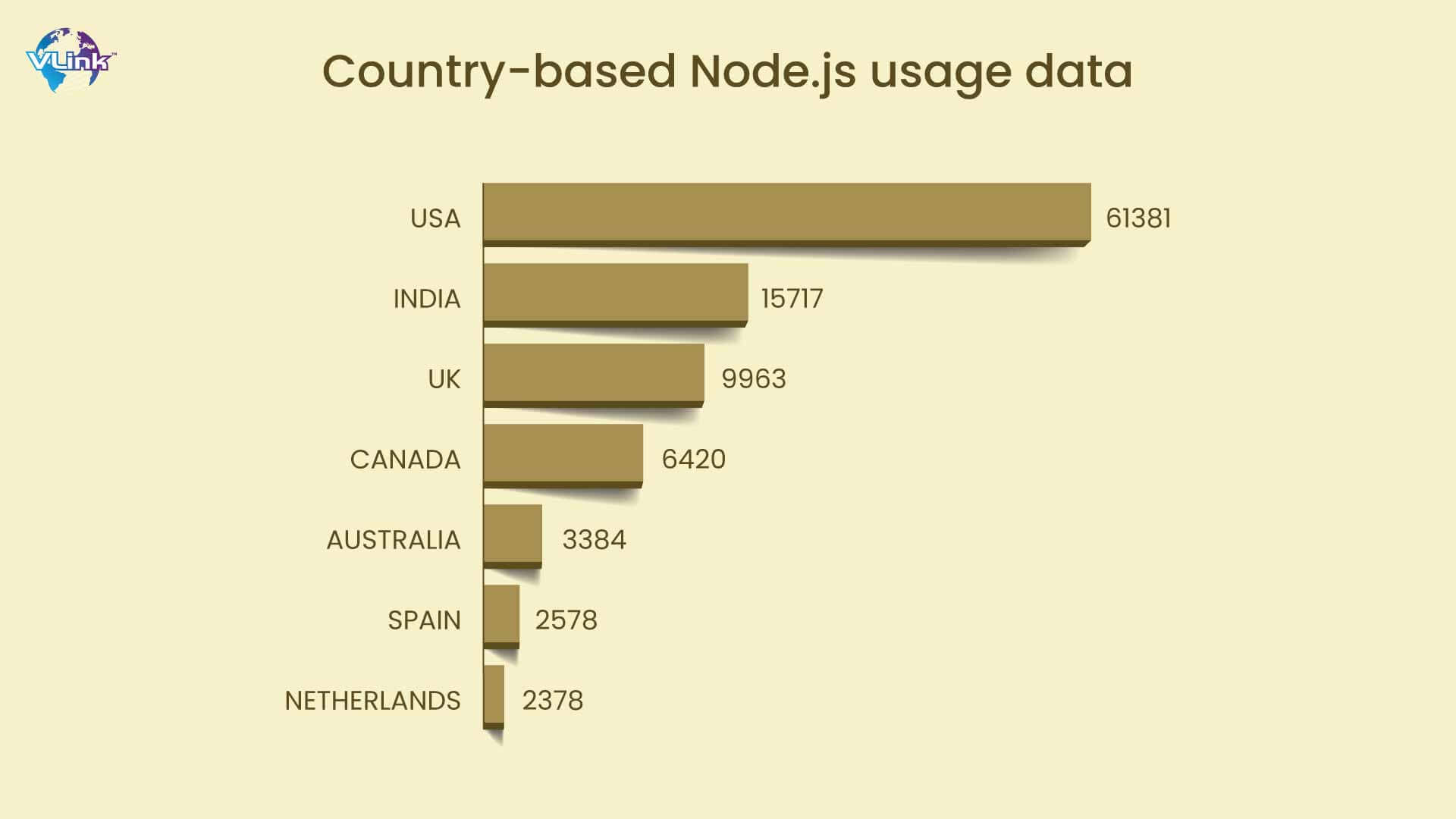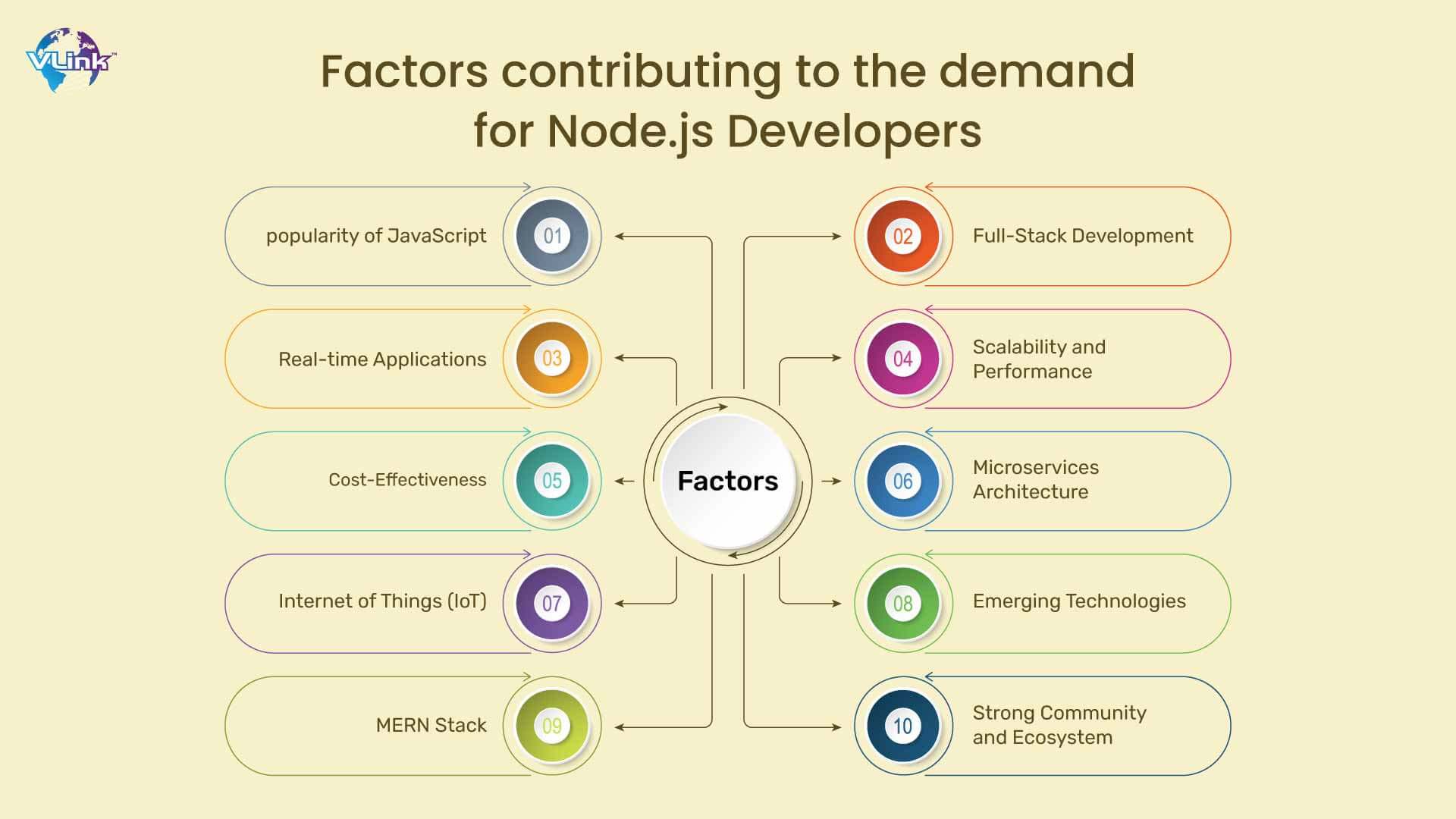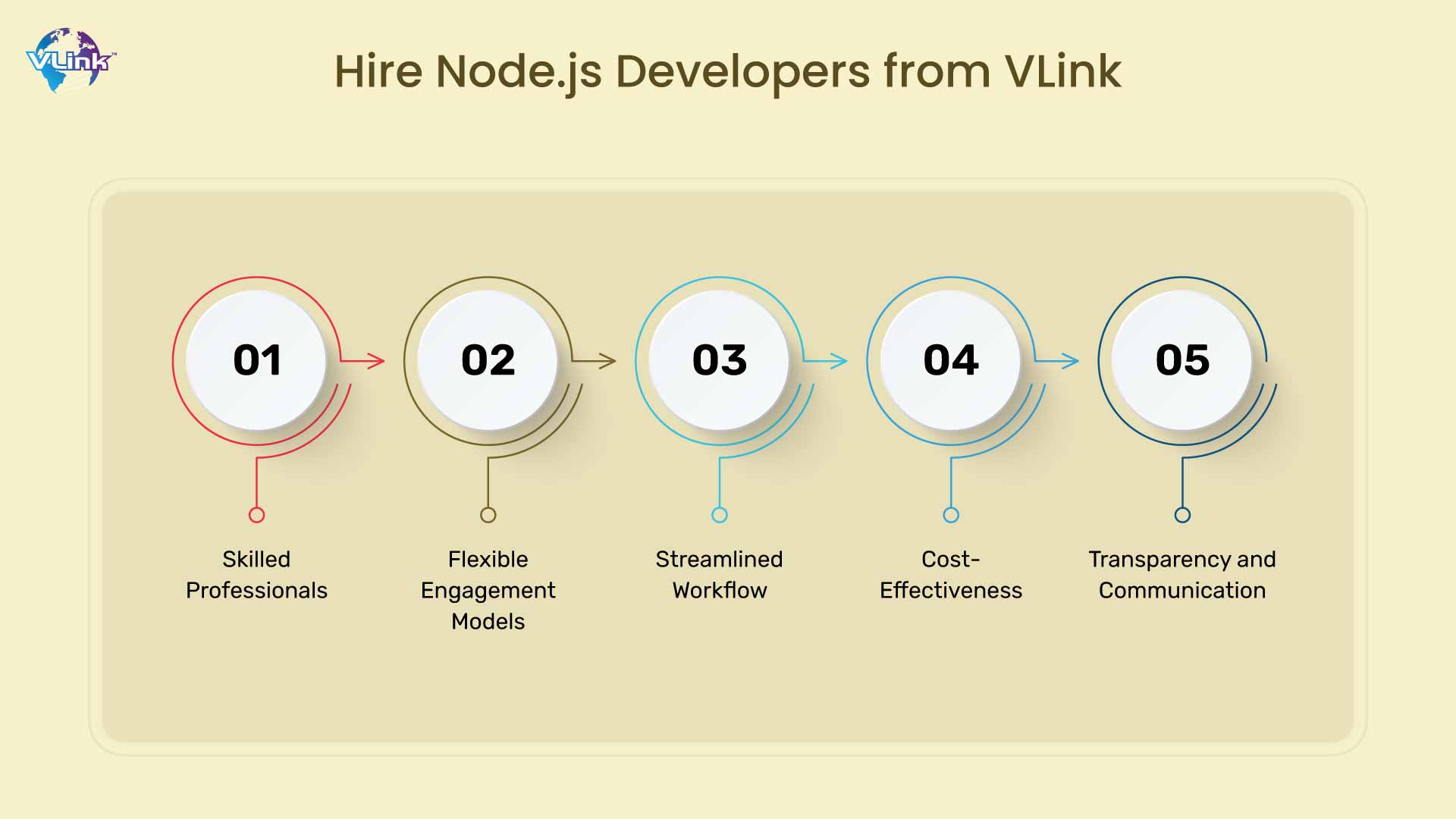The modern web development landscape is dynamic, constantly evolving to accommodate increasingly complex and interactive applications. In this ever-changing environment, Node.js has solidified its position as a powerful and versatile technology, driving a surge in demand for skilled Node.js developers.

This widespread adoption translates into a significant market need. This translates to a significant increase in demand for Node.js developers as companies seek professionals with this in-demand skill. The Node.js developer job market is booming, with Glassdoor reporting a staggering 32% increase in job postings over the past year alone.
But before diving headfirst into the Node.js world, let's address the job market of Node.js.
A Look at the Node.js Job Market
The demand for Node.js developers is scorching hot, with companies desperately seeking talent to fuel their back-end needs. This red-hot market translates into a goldmine of opportunities for skilled professionals.
Let's dive deeper with some data to back it up:
- A surge in job postings: How hot is this market? SlashData survey paints a clear picture – Node.js is the second most popular JavaScript framework globally, with over 43% of developers utilizing different Node.js libraries, frameworks, and IDEs for application development.
- Salary Satisfaction: The high demand doesn't just translate into more job options; it also means Node.js developers are handsomely rewarded for their expertise. According to Indeed, the average Node.js developer salary in the US is around USD 122,129 annually . This attractive compensation package makes Node.js a highly lucrative career path.
- Global Appeal: Forget location limitations! The need for Node.js developers transcends borders. Companies worldwide, from established giants to innovative startups, seek these skilled professionals to build the next generation of web applications. This global demand opens doors for geographically independent work opportunities, allowing you to choose your work environment.
These data points paint a clear picture: the Node.js job market is booming, offering exciting opportunities and competitive compensation for talented developers. If you're looking for a career path with high demand, global reach, and excellent earning potential, then Node.js might be the perfect fit.
But what's driving this strong demand for Node.js developers? Let's break down the key factors.
What Drives the Demand for Node.js Developers?

Several factors contribute to the surging demand for Node.js developers:
1. The popularity of JavaScript:
JavaScript, the language behind Node.js, is the world's most popular programming language. With a vast pool of JavaScript developers, companies can readily find talent with a strong foundation for picking up Node.js.
2. Full-Stack Development:
Node.js empowers developers to use JavaScript for both front-end and back-end development. This skill set is highly sought after, allowing companies to build applications with smaller, more efficient teams.
3. Real-time Applications:
The rise of real-time applications like chat platforms, collaborative tools, and online gaming has fueled the demand for Node.js due to its exceptional handling of these functionalities.
4. Scalability and Performance:
Businesses require applications that can adapt to growing user bases and traffic. Node.js's non-blocking architecture and event-driven nature make it ideal for building scalable and performant applications.
5. Cost-Effectiveness:
As mentioned previously, Node.js's open-source nature reduces development costs, making it an attractive option for businesses seeking cost-efficient solutions.
6. Microservices Architecture:
The popularity of microservices architecture, where applications are broken down into more minor, independent services, has later boosted the demand for Node.js. Node.js excels at building these microservices due to its lightweight nature and ability to handle asynchronous communication effectively.
7. Internet of Things (IoT):
The rapidly growing Internet of Things (IoT) landscape presents a significant opportunity for Node.js developers. Node.js is well-suited for building real-time applications that manage and communicate with a vast network of connected devices.
8. Emerging Technologies:
Node.js is constantly evolving and readily embraces new technologies. Its ability to integrate with cutting-edge advancements like serverless computing and artificial intelligence makes it a valuable asset for building future-proof applications.
9. MERN Stack:
The MERN stack (MongoDB, Express.js, React.js, and Node.js) has become famous for modern web applications. Node.js is critical in this stack, handling server-side logic and data communication.
10. Strong Community and Ecosystem:
The thriving Node.js community provides ongoing support, resources, and a continuous stream of innovative libraries and frameworks. This robust ecosystem empowers developers to build complex applications efficiently.
With such a compelling array of advantages, it's no wonder that Node.js has become the go-to technology for building robust and scalable applications.
Is Node.js the Right Choice for Your Project?

Here are seven factors to help you decide if Node.js is the ideal technology for your project:
- Scalability: Node.js excels at handling real-time applications with high user concurrency. Its asynchronous and event-driven architecture efficiently manages numerous connections without compromising performance.
- Real-time Features: If your project demands constant data updates and live interactions, Node.js is a perfect fit. Its ability to seamlessly handle WebSockets and server-sent events makes it the go-to choice for applications like chat rooms, collaborative tools, and online gaming platforms.
- Development Speed: Node.js empowers developers to leverage their existing JavaScript knowledge, streamlining the development process and accelerating project completion times. The vast ecosystem of libraries and frameworks available for Node.js boosts development efficiency.
- Cost-Effectiveness: Here's some good news—Node.js is open-source, eliminating licensing fees. Additionally, the faster development cycles enable the reduction of overall project costs.
- Single Language Stack: With Node.js, you can use JavaScript for both front-end and back-end development. This simplifies communication within development teams and fosters a more cohesive development process.
- Performance: Node.js is renowned for its exceptional performance, particularly for I/O-bound tasks. Its non-blocking nature allows it to handle multiple requests concurrently without compromising responsiveness.
- Active Community: Node.js boasts a large, vibrant developer community providing extensive support, resources, and ongoing innovation. This robust ecosystem empowers developers to build complex applications efficiently.
If these factors align with your project requirements, then Node.js could be the perfect foundation for building a scalable, efficient, and feature-rich application.
Now, let's delve deeper into the booming job market for Node.js developers.
Let's now explore some ideal use cases for Node.js.
Ideal Use Cases for Node.js
Node.js shines in various application development scenarios, particularly those requiring the following functionalities:
- Real-time Applications: Node.js is a champion for building real-time applications like chat rooms, collaborative editing tools, and online multiplayer games due to its ability to handle websockets and server-sent events efficiently.
- Data Streaming Applications: Node.js excels at handling real-time data streams, making it perfect for building applications like live dashboards, stock tickers, and social media feeds.
- Single-Page Applications (SPAs): Node.js serves as a robust back-end for SPAs, seamlessly handling API requests and data communication.
- Microservices Architecture: Node.js is a natural fit for building microservices due to its lightweight nature, asynchronous capabilities, and ability to communicate efficiently across services.
- I/O-Bound Applications: Node.js's non-blocking architecture is ideal for heavy I/O operations, such as file processing and data transfer.
- Content Management Systems (CMS): Node.js is a popular choice for building dynamic CMS platforms due to its scalability and ability to handle user interactions efficiently.
- APIs: Node.js is an excellent choice for building robust and scalable APIs that power mobile applications, web applications, and other software integrations.
- IoT Services: Node.js is well-suited for building applications that manage and communicate with a network of connected devices on the Internet of Things landscape.
Now, let's check out the summarized table provides a snapshot of the diverse application areas where Node.js excels, showcasing its versatility for building various functionalities.
| Use Case | Description |
| Real-time Applications | Chat applications, collaborative editing tools, online multiplayer games |
| Data Streaming Applications | Live dashboards, stock tickers, social media feeds |
| Single-Page Applications (SPAs) | Efficient back-end for SPAs, handling API requests and data communication |
| Microservices Architecture | Lightweight and efficient for building microservices with asynchronous communication |
| I/O-Bound Applications | File processing, data transfer (due to non-blocking architecture) |
| Content Management Systems (CMS) | Scalable and handles user interactions efficiently |
| APIs | Robust and scalable APIs for mobile apps, web apps, and integrations |
| IoT Applications | Manages and communicates with connected devices in the Internet of Things |
These are just some of the many ideal use cases for Node.js. With its versatility and performance, Node.js remains a top choice for developers building modern and innovative applications.
So, how do you go about hiring the right Node.js developer for your project? We'll explore some future aspects of Node.js in the next section.
Future of Node.js Developers
The future of Node.js developers looks bright. As the demand for real-time applications, scalable architectures, and innovative technologies continues to rise, so will the need for skilled Node.js professionals.
Here are some key trends shaping the future of this technology and its developers:
Node.js Version Management:
With frequent updates and new features introduced in Node.js, developers must stay updated on the latest versions and efficiently manage them across projects. Familiarity with version control tools and package managers will be essential.
Full-Stack Mastery:
Node.js developers will increasingly value the ability to work effectively with both front-end and back-end technologies like React.js or Angular. Understanding the entire development stack fosters better collaboration and allows developers to contribute across different project stages.
Microservices Expertise:
As microservices architecture continues to gain traction, proficiency in building and deploying microservices using Node.js will be a sought-after skill. Understanding how to break down complex applications into more minor, independent services that communicate effectively will be crucial.
Cloud-Native Development:
The growing adoption of cloud platforms necessitates developers with expertise in deploying and scaling Node.js applications on cloud environments like AWS, Azure, or Google Cloud Platform. Familiarity with containerization technologies like Docker will also be beneficial.
Integration with Emerging Technologies:
Node.js developers who integrate Node.js applications with cutting-edge technologies like serverless computing, artificial intelligence, and machine learning will be precious assets. Staying updated on these advancements and their potential applications will ensure developers remain relevant and in high demand.
By continuously learning and adapting to the evolving technological landscape, Node.js developers can ensure their skills remain relevant and in high demand for years to come.
Hire Node.js Developers from VLink

Hire Node.js developers can be time-consuming and challenging. VLink aims to streamline this process by providing access to a global pool of highly skilled and experienced Node.js developers.
Here's how VLink can assist you in building your dream team:
Skilled Professionals: VLink meticulously vets and selects developers based on rigorous technical assessments and real-world project experience. You can be confident that you're connecting with qualified Node.js developers who can deliver exceptional results.
Flexible Engagement Models: VLink offers various engagement models to cater to your project needs. Choose from dedicated teams for long-term projects, fixed-price models for projects with well-defined scope, or time and materials models for projects with evolving requirements.
Streamlined Workflow: VLink’s dedicated team manages the entire recruitment and onboarding process, saving you valuable time and resources. They handle candidate screening, technical assessments, and background checks, allowing you to focus on core project activities.
Cost-Effectiveness: VLink's solutions often provide cost advantages compared to traditional in-house hiring developers. You avoid the overhead costs of recruitment, infrastructure, and employee benefits.
Transparency and Communication: VLink prioritizes clear communication throughout the engagement. You'll receive regular progress updates and have a dedicated point of contact to ensure your project stays on track.
By partnering with VLink, you gain access to a broader talent pool, reduce hiring risks, and benefit from a streamlined and cost-effective process for finding the perfect Node.js developers for your project. Contact Us Now!
Conclusion
Node.js has established itself as a powerful and versatile technology for building modern web applications. The high demand for Node.js developers is a testament to its capabilities. Businesses seeking to build scalable, real-time, and feature-rich applications are actively seeking skilled Node.js developers.
By understanding the drivers of this demand, ideal use cases, and effective hiring strategies, you can leverage the power of Node.js and its developers to create innovative and successful applications.









 Shivisha Patel
Shivisha Patel

















